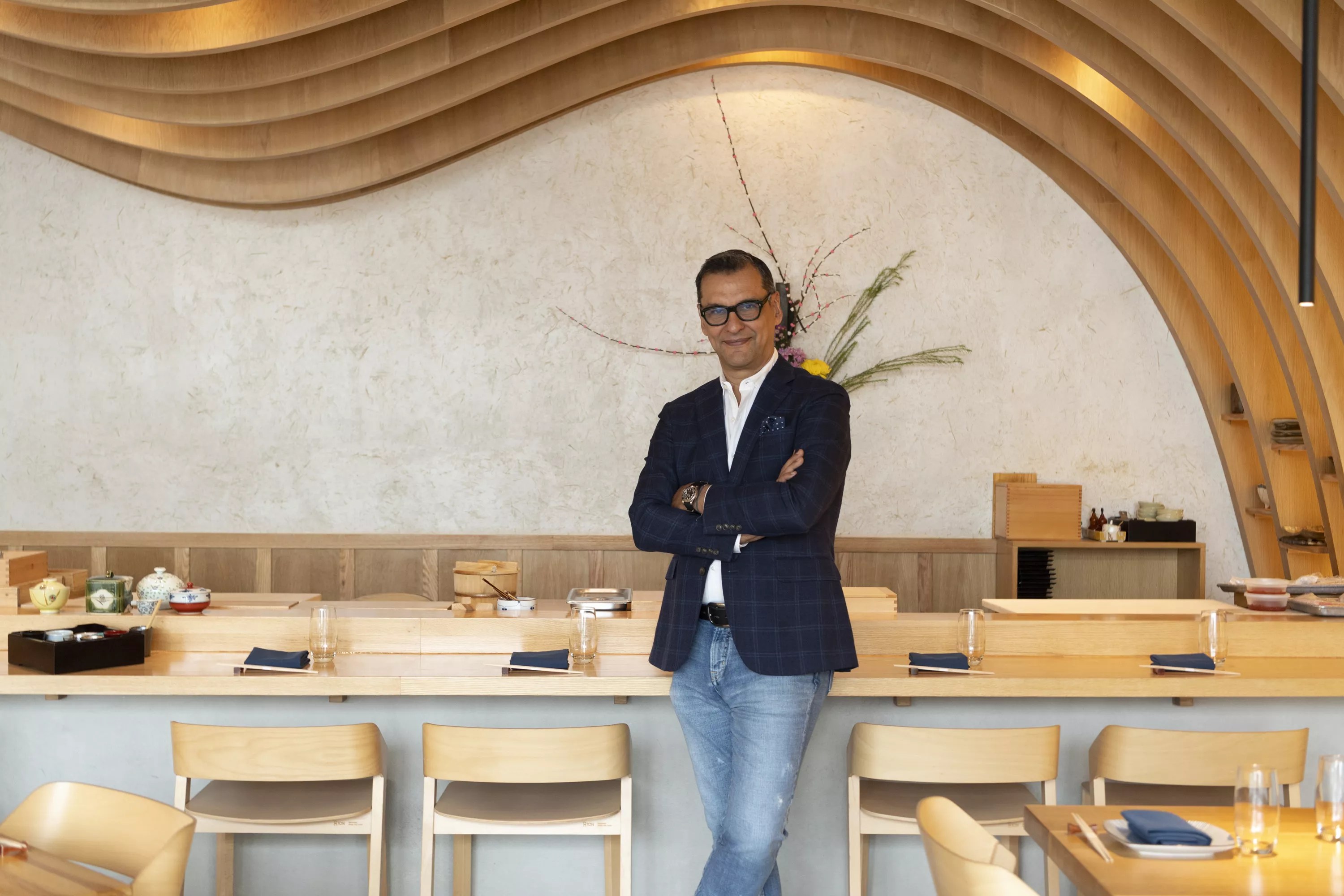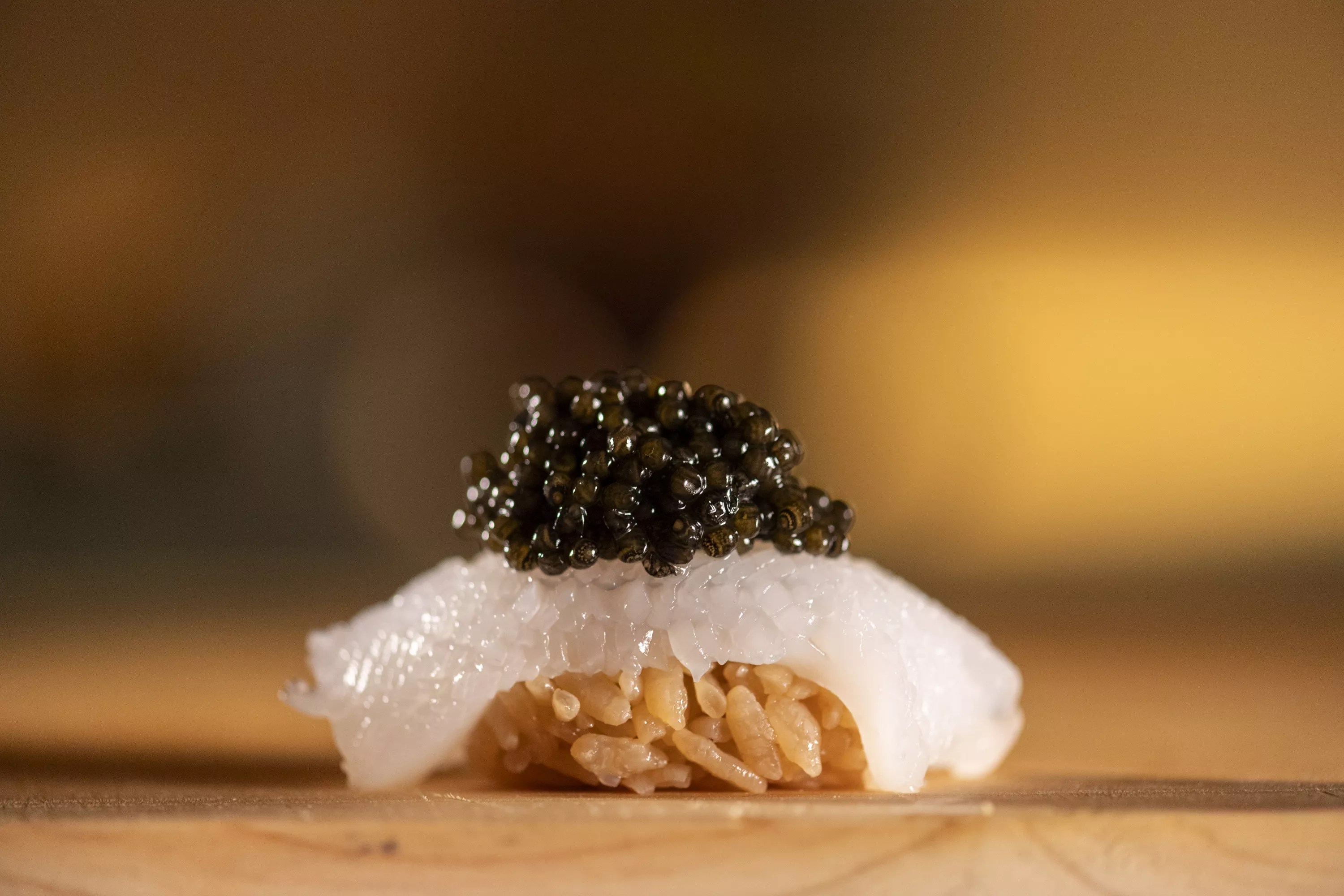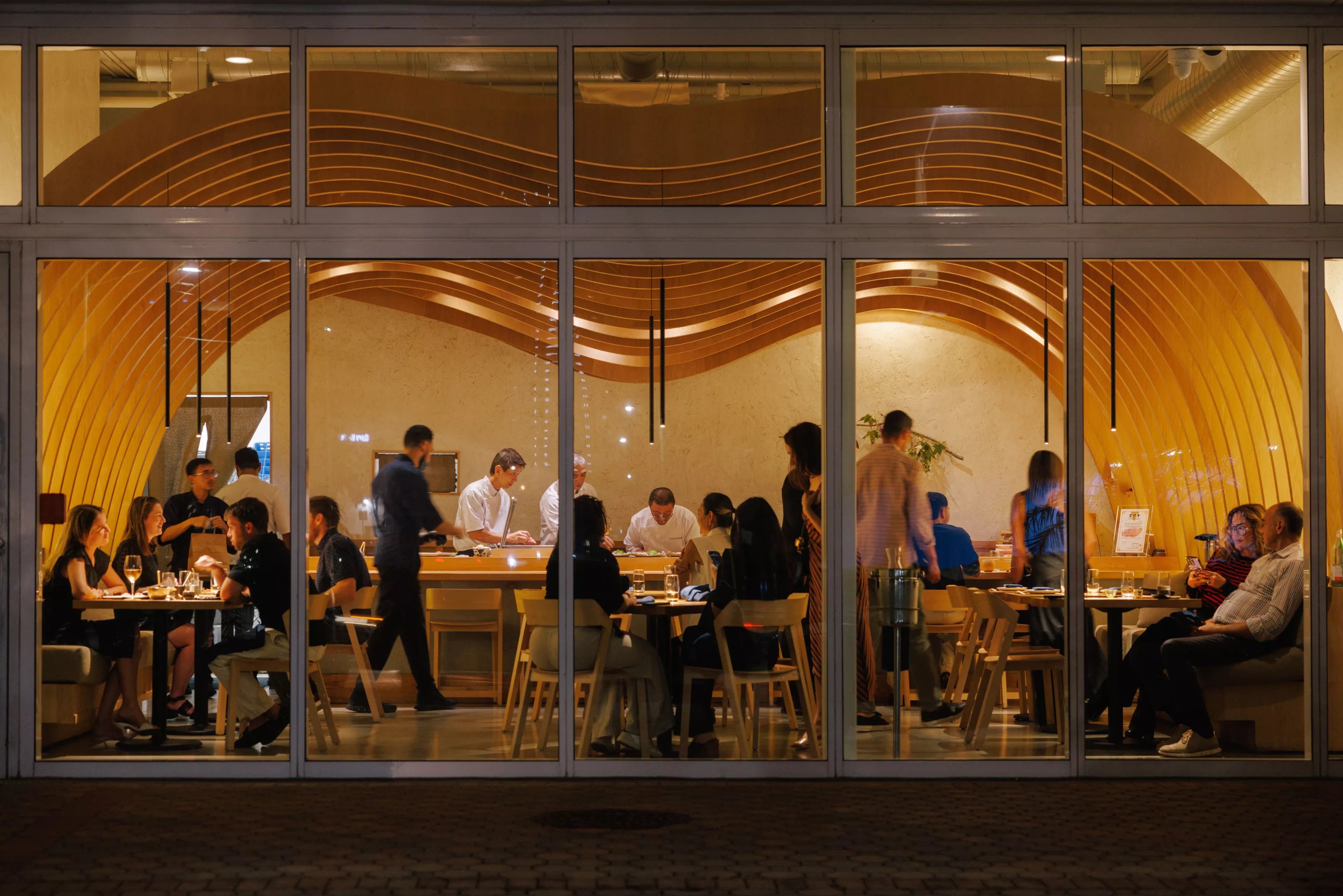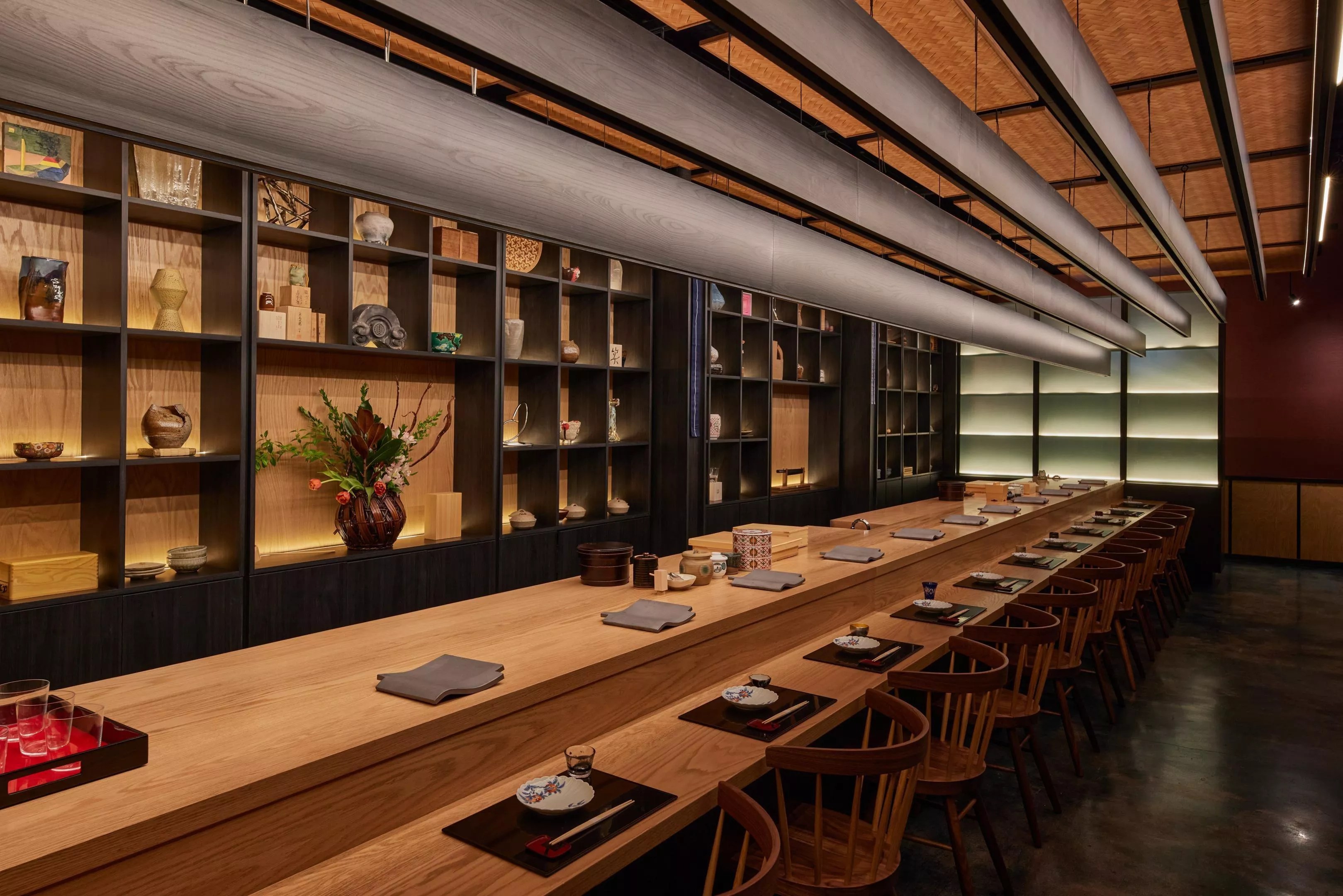
Photo by World Red Eye

Audio By Carbonatix
It’s not every day that a Venezuelan restaurateur becomes the face of Japanese cuisine in Miami, but Alvaro Perez Miranda has done just that. The entrepreneur has created four standout Japanese restaurants that each have their own aesthetic, from the cozy Wabi Sabi to the Michelin-starred Ogawa.
Named a Goodwill Ambassador for Japanese Cuisine by Japan’s Ministry of Agriculture, Forestry, and Fisheries in 2023, Perez Miranda is the first Latino to receive the honor. His success story is as layered as a piece of nigiri: art, reinvention, and an unwavering respect for authenticity.

Alvaro Perez Miranda at his second Miami restaurant, Hiyakawa
Photo by World Red Eye
From Busboy to Restaurant Mogul
Perez Miranda’s path to culinary prominence began in Caracas, Venezuela, where he nurtured a love for art that eventually took him to Florence at age 16. But it was in Los Angeles, working as a busboy at Café Roma in Beverly Hills, that he first encountered the energy of the restaurant world. “It was supposed to be temporary,” he recalls, “but I was hooked.”
By 24 he was managing Il Forno in Tokyo, an opportunity that immersed him in Japan’s culture. Over 15 years, he built a portfolio of 33 Italian restaurants across Japan, refining a sense of hospitality and artistry that now defines his Miami ventures. After stepping away from the industry for some years to focus on family and work as an art dealer, he found himself back in the game in 2014, revitalizing the restaurant at Miami’s historic Vagabond Motel and reigniting his passion for crafting unforgettable dining experiences.

Wabi Sabi’s 0 omakase menu, combined accessible pricing with a neighborhood vibe, creating a space where personal touches — like remembering guests’ names and dining preferences — set it apart.
Photo by World Red Eye
A Son’s Push and Wabi Sabi’s Birth
Perez Miranda’s return to restaurants came at the urging of his son. “He saw how much I missed it,” Perez Miranda shares. In 2018, he partnered with chef Shuji Hiyakawa to open Wabi Sabi on an unlikely stretch of the 79th Street Causeway east of Biscayne Boulevard. Guided by Japanese principles like omotenashi (hospitality) and sensai (delicacy), the restaurant struck a chord with diners. Wabi Sabi’s $100 omakase menu, featuring seafood flown directly from Tokyo, combined accessible pricing with a neighborhood vibe, creating a space where personal touches – like remembering guests’ names and dining preferences – set it apart. The result? A local favorite that became the blueprint for a burgeoning empire.
Expanding the Portfolio
Success bred ambition. In 2020, building on Wabi Sabi’s success, Perez Miranda launched the museumlike Hiyakawa with sushi master Masayuki Komatsu in Wynwood. The restaurant’s design, an undulating canopy of wooden slats framing the intimate dining area, reflects Perez Miranda’s passion for artistry, while the menu focuses on nigiri, sashimi, and other meticulously crafted dishes. “The idea was to create a place where the space itself was part of the dining experience,” Perez Miranda says. Hiyakawa quickly garnered acclaim for its top-tier sushi and immersive ambiance.
Then came Midorie in 2021, tucked away in Coconut Grove. Intimate and laidback, the ten-seat sushi bar features a whimsical mural of rainbow fish and turns out high-quality sushi at prices that welcome repeat visits. With plans to expand the concept to West Palm Beach and beyond, Perez Miranda envisions Midorie as a “template for accessible excellence.”

At Ogawa, chef and co-owner Masayuki Komatsu presides over a meticulous 19-course menu that starts with cooked dishes and finishes with a procession of top-notch nigiri.
Photo by World Red Eye
The Crown Jewel: Ogawa
Ogawa, Perez Miranda’s most ambitious project to date, opened last year in Little River. An intimate, 11-seat sushi bar offering just two seatings a night, it feels less like Miami than like a quiet, reverent corner of Japan. Chef and co-owner Masayuki Komatsu presides over a meticulous 19-course menu that unfolds in two acts. The first hour is devoted to zensai: a curated selection of starter plates from the kitchen, both hot and cold. As the evening transitions into its second hour, the sushi portion begins, with a parade of seasonal nigiri followed by a hand roll, miso soup, tamago, and a delicate dessert to finish.
Jazz hums softly in the background as diners sit at a low wooden counter, watching the chefs work with a quiet precision that borders on meditation. Outside, a Zen garden offers a tranquil escape to sip small-production sake, drowning out the city’s din.
Ogawa’s $350 experience – part cultural immersion, part culinary masterclass – feels closer to Osaka than to Miami. The restaurant’s name, which translates to “little river,” honors both the neighborhood and the restaurant’s Japanese roots. “Ogawa is about connecting people to Japanese culture,” Perez Miranda explains. Accolades followed swiftly, including a Michelin star.

At Hiyakawa, the restaurant’s design reflects Perez Miranda’s passion for artistry, while the menu focuses on nigiri, sashimi, and other meticulously crafted dishes.
Photo by James Jackman
Success and Ambition
In discussing what sets his restaurants apart from the many sushi spots across the city, Perez Miranda says meticulosity is the name of the game. “In all of our restaurants, no matter the level, the attention to detail has to be there. In Hiyakawa, for example, we greet you with a hot towel or a cold towel, depending on how the weather is,” he shares as an example.
“In addition to serving topnotch product, the vibe we put into our restaurants is also important. We’re friendly, we have a good attitude, and we love what we do. That’s something people can’t see but they can feel.”
The staffs are rigorously trained, and some even get a chance to travel to Japan to immerse themselves in the culture. “I pick one of my employees, and I bring them with me on my annual trips Japan so they can experience it. It’s a pricey thing to do, but I like it. For them, it can be a life-changing experience.”
The goodwill-ambassador nod from Japan’s Ministry of Agriculture, Forestry, and Fisheries emphasizes Perez Miranda’s role as a cultural bridge, promoting the traditions he so deeply respects. “I feel honored to be recognized by the Japanese government. Now I have that responsibility to keep doing what I’m doing the best way I can. Being the first Latino in this role is really meaningful to me,” he says.
The restaurant was one of only three new Miami restaurants to receive a Michelin star last year – not to mention “Best Japanese Restaurant” honors in New Times‘ 2024 Best of Miami issue and a perfect 5.0 rating from reviewers on Google.

The minimalist interior at Ogawa
Photo by Michael Pisarri
Looking Ahead
Perez Miranda’s ambitions stretch far beyond sushi. It’s a vision that aims to elevate Miami as a global destination for Japanese cuisine. He also plans to expand his growing empire with restaurants specializing in diverse aspects of Japanese culinary traditions.
“I have a few other projects in the pipeline with Japanese cuisine that aren’t sushi,” he says. “The sushi market is a little saturated, so I want to apply the same philosophy – focusing on a few amazing products – but in a different way. Stay tuned for details,” he adds with a wink.
But his aspirations don’t end there. Perez Miranda dreams of bringing his flagship Hiyakawa concept to Japan, a move that would complete the cultural circle he began decades ago. “I want to put Miami on the map for Japanese food, so why not bring a concept back to Japan?” he says.
“Miami’s culinary scene has grown tremendously, but there’s still so much untapped potential. I want to keep pushing the boundaries of what Japanese cuisine can be in this city – and beyond.”
WabiSabi. 851 NE 79th St., Miami; 305-890-7228; wabisabimiami.com.
Hiyakawa. 2700 N. Miami Ave., Miami; 305-333-2417; hiyakawamiami.com.
Midorie. 3444 Main Hwy., Coconut Grove; midoriemiami.com.
Ogawa. 7223 NW Second Ave., Miami; ogawamiami.com.